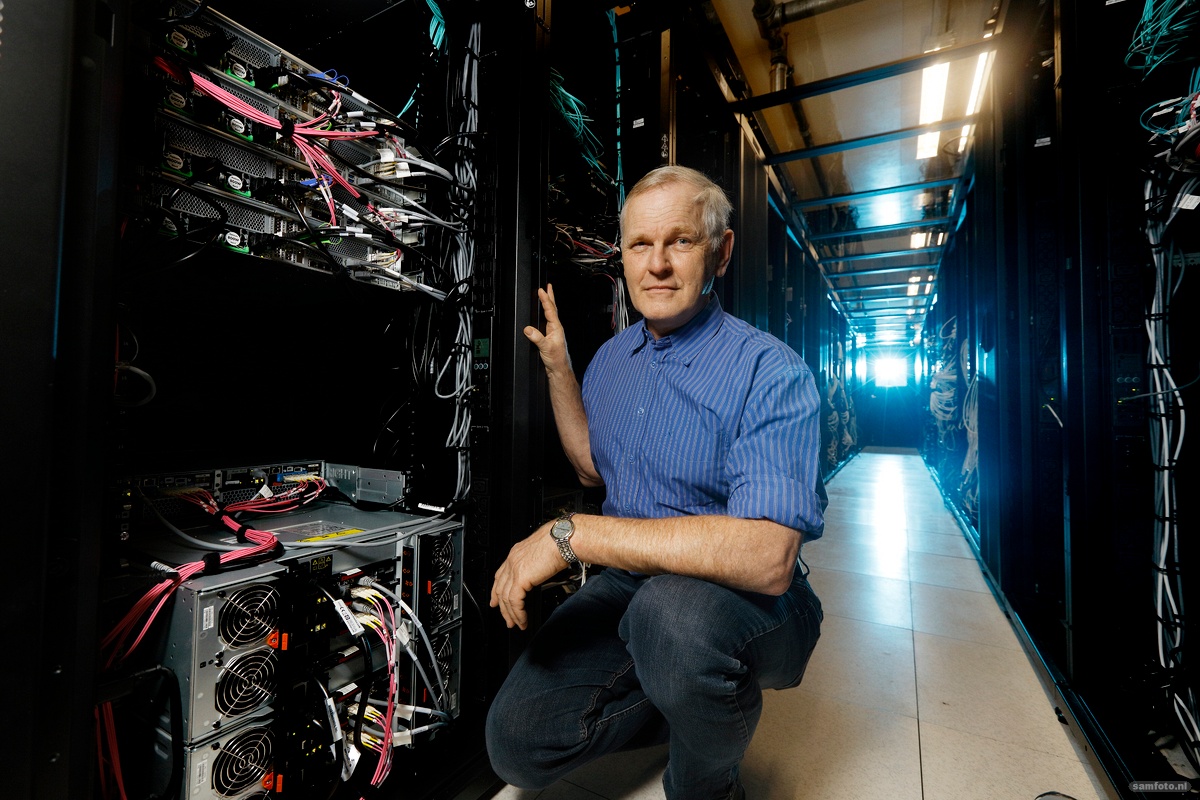PhD students and staff with a TU Delft NetID will be able to log on to the new DelftBlue supercomputer from 20 June. ICT-staff have ironed out all wrinkles last six months.
Powerful computers are therefore indispensable in keeping up with the technical sciences. says Kees Vuik. (Photo: Sam Rentmeester)
The size and power of supercomputers is hard to say. In the top 500 of the world’s most powerful computers, DelftBlue is at number 250 with a speed of two petaflops. This gives an idea of the power of this supercomputer, which now takes up about a third of the TU Delft data centre.
Twenty racks containing 400 connected modules, each with 12 or 24 processors, in total 20,000 units. This is the DelftBlue installation. In addition, there are 10 modules with four fast graphics cards each of which are specially used for fast repetitive calculations. About a quarter of the space is used for data storage. Six racks were still empty when the system was delivered. In 18 months’ time, they will be filled with whatever proves to be most urgent, says Professor of Numerical Analysis Kees Vuik.
Vuik is the Scientific Director of the Delft High Performance Computing Centre (DHPC), the official name of the computing centre, and is also the Scientific Director of the Delft Institute for Computational Science and Engineering (DCSE). Vuik emphasises that DelftBlue will soon be widely accessible. “Bachelor students can take the minor in Computational Science, or the optional course in High Performance Computing. Master students are eligible for the Advanced High Performance Computing course and, just like PhD students, can have their study supervisor apply for a research budget.”
Lowering the threshold
This distribution is also reflected in the time planning for DelftBlue: 10% is reserved for education, 80% for research work and the remaining 10% of the time for maintenance, extensions and updates.
To make the threshold to using the supercomputer as low as possible, every faculty except IDE, will make two to three DHPC user group members available to help students and staff with everyday user problems.
In addition, each faculty involved has one employee in the expert pool who provides support, instruction, and training. The DHPC itself makes two service employees specialised in high performance computing available, in addition to four people from IT support.
Data and computing power are becoming increasingly important, states DHPC on its website. This is partly because of the increasing importance of detailed simulations, and partly because of the increase in the amount of data in virtually every field of research. Powerful computers are therefore indispensable in keeping up with the technical sciences.
Driven by this conviction, in March 2017 Vuik and IT Manager Frans Broos took the initiative to build a new supercomputer at TU Delft. Four years later, at the end of March 2021, Rector Tim van der Hagen signed the delivery contract for EUR 4.5 million with computer manufacturer Fujitsu on behalf of TU Delft. The delivery took place on 20 January 2022. The last five months ICT-professionals and beta-users have been busy ironing out all wrinkles so that general user acces should now run smoothly.
From June 20th, every TU Delft employee and PhD student will be able to log on to the DelftBlue, using their NetID. Students don’t have access automatically, says Vuik. They should apply for access with their BSc or MSc study supervisor.
An impression of the DelftBlue supercomputer under construction. (Video: TU Delft)
Do you have a question or comment about this article?
j.w.wassink@tudelft.nl


Comments are closed.